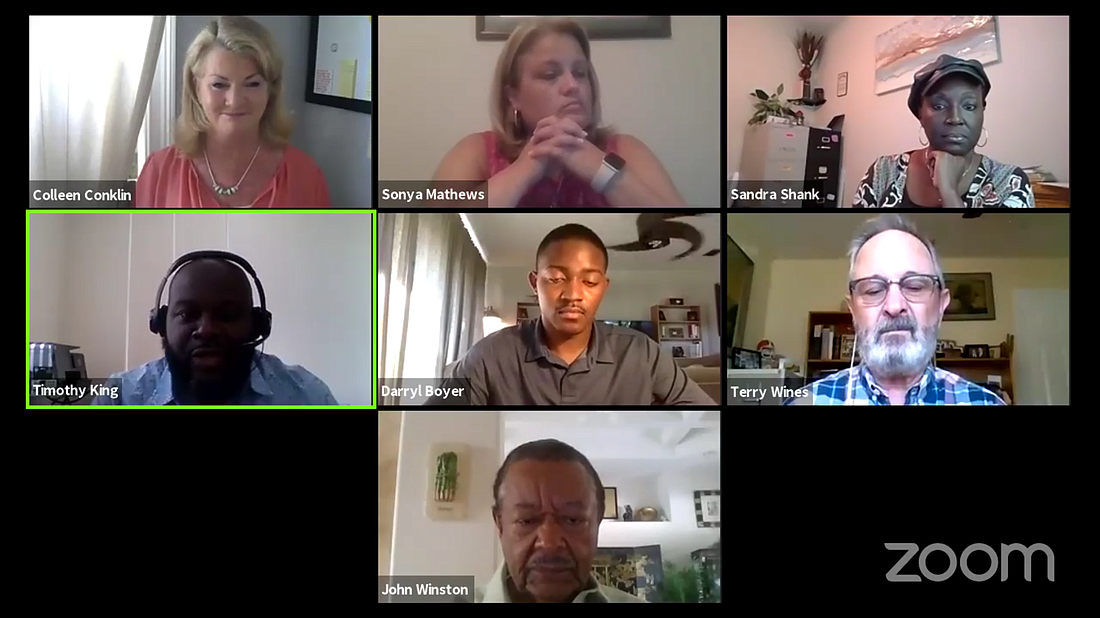- December 13, 2025

by: Brent Woronoff
Contributing Writer
Flagler County School Board Vice Chairwoman Colleen Conklin titled her three-part panel discussion on race relations, “Uncomfortable Conversations: a Time to Lean in.” The voices heard in the first discussion were candid, impassioned and heartfelt as well as uncomfortable at times.
The three-part Zoom webinar began Thursday, June 18, and will continue the next two Thursday nights, June 25 and July 2, beginning at 6 p.m. Each discussion will also be streamed on Facebook Live.
Conklin and Tim King, the former director of Flagler Schools Exceptional Student Education, are the moderators for the series. The other panel members will change each week.
In announcing the series on Facebook and Twitter, Conklin said the purpose of the discussions is “to open and broaden the perspective of those who are struggling to understand what is currently happening in our country as it relates to race. I truly believe we are at a tipping point in our nation and have a responsibility to engage in conversation we may typically shy away from or be afraid to engage in.”
The first discussion, titled, “Building a Foundation of Understanding: A Time to Lean In,” can be viewed at https://www.facebook.com/flaglerschoolnews.conklin/videos/279552979857923. It had more than 1,200 views on Facebook.
“Obviously a lot is going on in our world,” Conklin said in introducing the discussion. “Our nation is hurting, and when we were discussing how can we open up a dialogue here in Flagler County, we thought of a panel discussion.”
The first discussion went far beyond the current protests throughout the nation spurred on by the death of George Floyd. Each of the five guest panelists shared their experiences and views on racism.
"We are at a tipping point in our nation and have a responsibility to engage in conversation we may typically shy away from or be afraid to engage in.”
COLLEEN CONKLIN, School Board member
Sonya Mathews, the mother of three biracial children, said she’s had conversations daily with her children on how to behave around policemen, or on the basketball court at night.
“You’re always constantly worrying,” she said. “There’s a conversation every day.”
She worried that they wouldn’t be accepted by some people because of the color of their skin. When one of her sons had a girlfriend, she had to ask, “Do her parents know you’re biracial?” She said her oldest son is in pharmacy school and her middle son is in the Naval Academy, but it doesn’t matter because incidents can happen in a split second.
“There’s not enough time to show their resume,” she said. “But what’s more important is they shouldn’t have to.”
College student Darryl Boyer said, “Until we accept the fact that we have issues, we can’t move forward.”
John Winston, a Navy veteran and retired medical researcher, said he grew up during segregation and later experienced discrimination in the workplace.
“Until we can stop this lunacy of judging people by the color of their skin and not by the content of their character and their actions, we’ll never cross the bar,” he said. “But we’ve come too far to turn back.”
Sandra Shank, who said she has four biological sons and several more sons in a group home she runs, alluded to the many shades of racism.
“I know dark-skinned women who got bullied (in school),” Boyer said. “They felt they’d never be loved.”
Shank said she experienced that growing up in Miami but had two lighter-skinned sisters who “were so loving and provided me a safety net.”
King said back when he was hired as an assistant principal another teacher that he respected and was also up for the job congratulated him, but added, “You were the right color for the job.”
“I valued him and I valued his opinion, and I realized he didn’t think I was qualified for the job,” King said. “It made me question myself, ‘Have I earned this job?’ Then I realized, yes, I did.”
Terry Wines, the pastor at the First United Methodist Church in Bunnell, said, “Unfortunately we gravitate to the people we tend to agree with more … We need to become better listeners.”